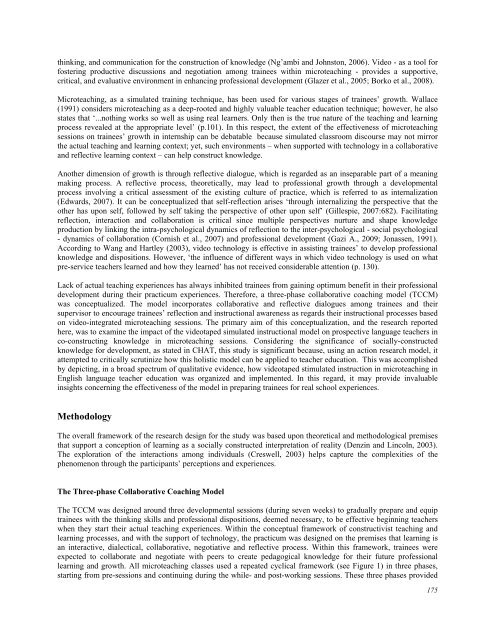January 2012 Volume 15 Number 1 - Educational Technology ...
January 2012 Volume 15 Number 1 - Educational Technology ...
January 2012 Volume 15 Number 1 - Educational Technology ...
Create successful ePaper yourself
Turn your PDF publications into a flip-book with our unique Google optimized e-Paper software.
thinking, and communication for the construction of knowledge (Ng’ambi and Johnston, 2006). Video - as a tool for<br />
fostering productive discussions and negotiation among trainees within microteaching - provides a supportive,<br />
critical, and evaluative environment in enhancing professional development (Glazer et al., 2005; Borko et al., 2008).<br />
Microteaching, as a simulated training technique, has been used for various stages of trainees’ growth. Wallace<br />
(1991) considers microteaching as a deep-rooted and highly valuable teacher education technique; however, he also<br />
states that ‘...nothing works so well as using real learners. Only then is the true nature of the teaching and learning<br />
process revealed at the appropriate level’ (p.101). In this respect, the extent of the effectiveness of microteaching<br />
sessions on trainees’ growth in internship can be debatable because simulated classroom discourse may not mirror<br />
the actual teaching and learning context; yet, such environments – when supported with technology in a collaborative<br />
and reflective learning context – can help construct knowledge.<br />
Another dimension of growth is through reflective dialogue, which is regarded as an inseparable part of a meaning<br />
making process. A reflective process, theoretically, may lead to professional growth through a developmental<br />
process involving a critical assessment of the existing culture of practice, which is referred to as internalization<br />
(Edwards, 2007). It can be conceptualized that self-reflection arises ‘through internalizing the perspective that the<br />
other has upon self, followed by self taking the perspective of other upon self’ (Gillespie, 2007:682). Facilitating<br />
reflection, interaction and collaboration is critical since multiple perspectives nurture and shape knowledge<br />
production by linking the intra-psychological dynamics of reflection to the inter-psychological - social psychological<br />
- dynamics of collaboration (Cornish et al., 2007) and professional development (Gazi A., 2009; Jonassen, 1991).<br />
According to Wang and Hartley (2003), video technology is effective in assisting trainees’ to develop professional<br />
knowledge and dispositions. However, ‘the influence of different ways in which video technology is used on what<br />
pre-service teachers learned and how they learned’ has not received considerable attention (p. 130).<br />
Lack of actual teaching experiences has always inhibited trainees from gaining optimum benefit in their professional<br />
development during their practicum experiences. Therefore, a three-phase collaborative coaching model (TCCM)<br />
was conceptualized. The model incorporates collaborative and reflective dialogues among trainees and their<br />
supervisor to encourage trainees’ reflection and instructional awareness as regards their instructional processes based<br />
on video-integrated microteaching sessions. The primary aim of this conceptualization, and the research reported<br />
here, was to examine the impact of the videotaped simulated instructional model on prospective language teachers in<br />
co-constructing knowledge in microteaching sessions. Considering the significance of socially-constructed<br />
knowledge for development, as stated in CHAT, this study is significant because, using an action research model, it<br />
attempted to critically scrutinize how this holistic model can be applied to teacher education. This was accomplished<br />
by depicting, in a broad spectrum of qualitative evidence, how videotaped stimulated instruction in microteaching in<br />
English language teacher education was organized and implemented. In this regard, it may provide invaluable<br />
insights concerning the effectiveness of the model in preparing trainees for real school experiences.<br />
Methodology<br />
The overall framework of the research design for the study was based upon theoretical and methodological premises<br />
that support a conception of learning as a socially constructed interpretation of reality (Denzin and Lincoln, 2003).<br />
The exploration of the interactions among individuals (Creswell, 2003) helps capture the complexities of the<br />
phenomenon through the participants’ perceptions and experiences.<br />
The Three-phase Collaborative Coaching Model<br />
The TCCM was designed around three developmental sessions (during seven weeks) to gradually prepare and equip<br />
trainees with the thinking skills and professional dispositions, deemed necessary, to be effective beginning teachers<br />
when they start their actual teaching experiences. Within the conceptual framework of constructivist teaching and<br />
learning processes, and with the support of technology, the practicum was designed on the premises that learning is<br />
an interactive, dialectical, collaborative, negotiative and reflective process. Within this framework, trainees were<br />
expected to collaborate and negotiate with peers to create pedagogical knowledge for their future professional<br />
learning and growth. All microteaching classes used a repeated cyclical framework (see Figure 1) in three phases,<br />
starting from pre-sessions and continuing during the while- and post-working sessions. These three phases provided<br />
175

















